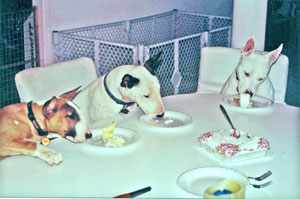OHIO: THE BATTLEGROUND STATE FOR BSL, OR HOPE SPRINGS ETERNAL IN THE BUCKEYE STATE
By: Date: 03/8/2006
Cincinnati , Ohio, March 8: Ohio is poised on the cusp of dog law history. Two recent court decisions and a battle over dangerous dog legislation in the state assembly make the Buckeye State the one to watch in the march towards more reasonable, pet friendly animal control statutes.
 In September 2004, the Ohio Supreme Court ruled that the state’s dog control breed specific dog law was unconstitutional because it failed to provide due process for owners of dogs accused of aggressive behavior. This decision threw county dog wardens and prosecutors into a tizzy: not only did it toss out the law forcing owners to buy liability insurance and build a pen for all dogs that behaved aggressively; it cast a fog over the breed-specific portion of the law that tagged pit bulls as inherently vicious.
In September 2004, the Ohio Supreme Court ruled that the state’s dog control breed specific dog law was unconstitutional because it failed to provide due process for owners of dogs accused of aggressive behavior. This decision threw county dog wardens and prosecutors into a tizzy: not only did it toss out the law forcing owners to buy liability insurance and build a pen for all dogs that behaved aggressively; it cast a fog over the breed-specific portion of the law that tagged pit bulls as inherently vicious.
County dog wardens and prosecutors scrambled to figure out whether they could still consider pit bulls as vicious without providing a court hearing for owners. Some said yes, others said no. The result? Owning an American Staffordshire Terrier in one county meant buying insurance and building a locked pen, while owning the same dog in another county brought no sanctions.
In early 2005, Representative Kathleen Walcher introduced HB 189 , a bill to require due process for accused owners and to drop the sanctions against pit bull ownership. Dog wardens rebelled, and the bill stalled. Lawmakers considered separating the two parts of the bill, i.e., addressing due process in one bill and leaving the pit bull question for a separate bill drafted by Representative Shawn Webster, a veterinarian who co-sponsored HB 189.
Then came the March 3 appellate court decision ruling the pit bull restrictions unconstitutional on several grounds, including failure to provide due process for dog owners and lack of evidence that the restrictions were effective in protecting the community from vicious dogs. Although it may be appealed, the language of the decision lays out the case against BSL with unequivocal clarity, a distinct boon for people fighting breed-specific bills and seeking due process assurances in other jurisdictions.
This mishmash of court decisions, individual county enforcement policies, and legislative efforts highlights the struggle to update animal control laws in many areas. In the past, lawmakers, dog wardens, and local and state politicians often formed intimidating coalitions that ran roughshod over the rights of animal owners, but these tactics are failing as dogs are more and more considered to be family members and pet owners are fighting back. Many states and local jurisdictions that now give dog wardens the power to declare a dog or owner guilty, order disciplinary action, and seize animals without a court order or an opportunity for owners to challenge the charges are faced with organized opposition from dog owners, veterinarians, dog trainers, and other experts in animal husbandry and behavior.
It’s obviously an uphill battle. Special interest groups want to expand dog warden powers, not reduce them, and then add breeding restrictions, kennel licenses, animal husbandry restrictions, and severe punishments to the legal sausage. In many areas, dog wardens and government officials want to expand BSL, not eliminate it.
However, Ohio has a chance to get it right. The appellate court decision could be appealed and the bill eliminating pit bull restrictions from the law could be defeated, but reason and good law could also prevail, giving the state a model animal control law that could even serve as an example to other jurisdictions.
NAIA held a dangerous dog conference in the Cincinnati area in 2004, shortly after the Ohio Supreme Court decision to toss out the dangerous dog provision. That conference sparked creation of guidelines for a pet friendly ordinance and development of a model ordinance to help communities and states modernize their laws without placing undue burdens on responsible owners.
Photo shows Rufus, the 2006 Westminster Kennel Club Best in Show Winner, sharing a piece of cake with friends at his victory party. The status of Rufus and other Bull Terriers has been uncertain in Ohio where one attorney general opined that a pit bull is "an animal which displays the general physical characteristics of a bull terrier.”






